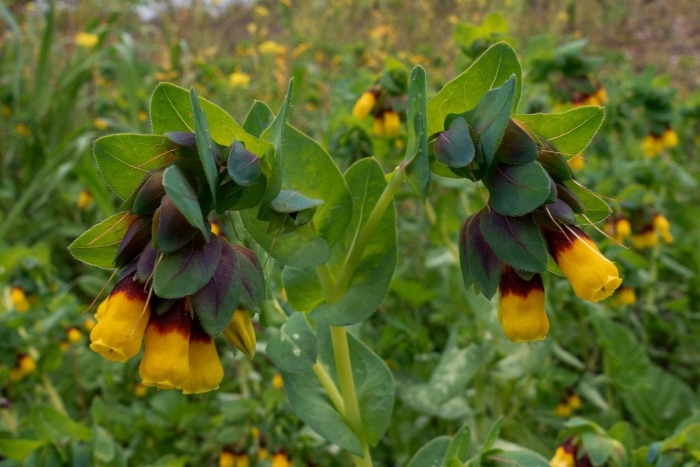Honeywort
(Cerinthe major)
Honeywort (Cerinthe major)
/
/

rodnas
CC BY-SA 4.0
Image By:
rodnas
Recorded By:
Copyright:
CC BY-SA 4.0
Copyright Notice:
Photo by: rodnas | License Type: CC BY-SA 4.0 | License URL: https://creativecommons.org/licenses/by-sa/4.0/ | Attribution: rodnas (cc-by-sa) | Rights Holder: rodnas | Publisher: PlantNet | Date Created: 2019-04-26T09:08:04.517Z | Title: Cerinthe major L.: flower | Notes: Cerinthe major L.: flower |



















































Estimated Native Range
Summary
Cerinthe major, commonly known as Honeywort, is an annual or biennial herb native to open woodlands, meadows, and scrub areas in the Mediterranean region. It typically grows to a height of 1-3 feet (0.3-0.9 meters) and a width of 1-2 feet (0.3-0.6 meters). Honeywort is characterized by its nodding, tubular flowers that come in shades of blue, yellow, purple, and red, often with contrasting bracts, and it blooms in the spring, summer, and fall. The flowers are particularly attractive to bees and hummingbirds, adding to the plant’s ornamental value.
Honeywort is valued for its unique flower coloration and its ability to attract pollinators. It is often used in borders, container gardens, and as a cut flower in floral arrangements due to its interesting form and color. This plant is relatively low-maintenance, thriving in full sun and well-drained soil, and it tolerates drought once established. Gardeners can select from various cultivars, such as Cerinthe major subsp. major, which features sea-green bracts and yellow flowers, and Cerinthe major subsp. purpurascens, known for its blue bracts and purple flowers. While generally disease-free, Honeywort can occasionally suffer from root rot if overwatered or planted in poorly drained soils.CC BY-SA 4.0
Honeywort is valued for its unique flower coloration and its ability to attract pollinators. It is often used in borders, container gardens, and as a cut flower in floral arrangements due to its interesting form and color. This plant is relatively low-maintenance, thriving in full sun and well-drained soil, and it tolerates drought once established. Gardeners can select from various cultivars, such as Cerinthe major subsp. major, which features sea-green bracts and yellow flowers, and Cerinthe major subsp. purpurascens, known for its blue bracts and purple flowers. While generally disease-free, Honeywort can occasionally suffer from root rot if overwatered or planted in poorly drained soils.CC BY-SA 4.0
Plant Description
- Plant Type: Herb
- Height: 1-3 feet
- Width: 1-1.5 feet
- Growth Rate: Moderate
- Flower Color: Purple
- Flowering Season: Spring, Summer, Fall
- Leaf Retention: Deciduous
Growth Requirements
- Sun: Full Sun
- Water: Low, Medium
- Drainage: Medium
Common Uses
Bee Garden, Bird Garden, Border Plant, Hummingbird Garden, Low Maintenance, Potted Plant, Rock Garden, Salt Tolerant, Street Planting
Natural Habitat
Open woodlands, meadows, and scrub areas in the Mediterranean region
Other Names
Common Names: Blue Shrimp Plant, Great Honeywort, Greater Honeywort, Große Wachsblume, Grand Mélinet, Groot Wasbloempje, Stor Vaxblomma
Scientific Names: , Cerinthe major, Cerinthe strigosa, Cerinthe gymnandra var. iberica, Cerinthe gymnandra var. macrosiphon, Ceranthe acuta, Cerinthe acuta, Cerinthe aperta, Cerinthe glauca, Cerinthe major f. pseudopallida
GBIF Accepted Name: Cerinthe major L.